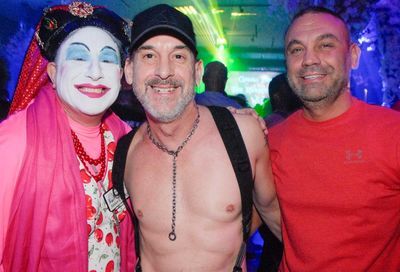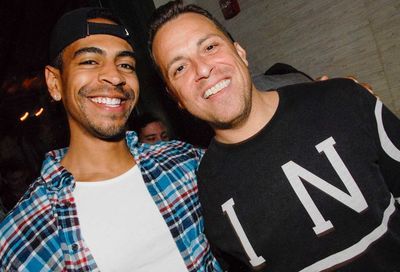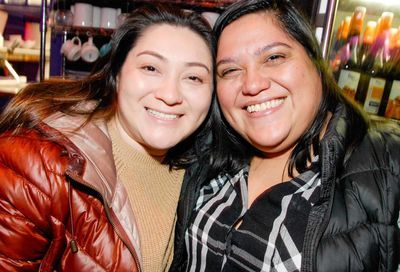Bias Ball
Commentary: Stonewall Baby
It’s Monday, July 13, and Sonia Sotomayor has begun her Senate hearings. My guess is that she will soon be named to the Supreme Court. That she is a Latina from a working-class background is a good thing. At least, it is to me, because of my various biases.
That her own biases were getting her into trouble will remain the most notable wrinkle in this whole process, though so much of the brouhaha left me scratching my head, wondering why her frank statements were upsetting some straight white guys. Newt, Rush and Karl took their shots. Granted, there were some ethnically diverse shots from the right, too, as well as Miss Coulter’s.
Bias is something we may not like to talk about in judges, though every judge carries his or her biases — as do we all. As a journalist, I understand the desire for objectivity. I also know, thanks in part to a particular journalism school professor, Wilma Wirt, that objectivity is an unattainable goal.
When Sotomayor credits being a Latina with helping her to make better decisions, that makes perfect sense. Perhaps this threatens someone who imagines how silly it would sound if Chief Justice John Roberts credited his being a straight white guy (SWG) with expanding his world view and breadth of knowledge. I don’t question his credentials, and I congratulate him if being a SWG has helped him get to his impressive station in life. And while he may have a sharp mind, I doubt his SWG identity prompted his various examinations of life. On the other hand, many of the components that come together in Sotomayor would surely have forced such examinations. Imagine the two as children, watching the same episode of the “all-American” Father Knows Best. They were bound to see different realities within the same two black-and-white dimensions.
As a nation of people, we also have our collective biases. Consider the United States Holocaust Memorial Museum downtown. It is the most powerful, most meaningful of all the District’s museums. But why do we not also have a national museum downtown dedicated to the history of slavery in the U.S., with a life-size replica of a slave ship and a diorama display of a slave family being separated at auction? One can only guess that the collective majority is not yet ready to examine our own history’s foremost example of Americans as the “bad guys” — allowing for a nod to the National Museum for the American Indian for some of its exhibits that have sought to heal similar wounds. We look much better in a World War II light, hands down.
My biases stem from a seemingly infinite number of points. I’m gay. I was raised Catholic. Today I’m somewhere between Taoism and atheism. My ancestry is largely Irish and Swiss. I don’t own a car. After a rude awakening during the 1992 primary season in Richmond, in which the Democratic machinery practically sabotaged my Jerry Brown camp in favor of Bill Clinton, I dropped my Democratic affiliation and registered as a Green. I’m pro-choice. I’ve lived in a Muslim country. My partner is Latino. I don’t like crowds. I romanticized Lenin, to a degree, when I was in college. Today, I firmly believe that power corrupts. Fundamentalists — religious, environmentalist, activist, anything — put me on edge. I’m terrified by the thought of me in drag. I am loyal to the Star Alliance. I was a vegetarian for a few years. I live in Shaw. The Empire Strikes Back was the best of the six. The U.S., by virtue of the Constitution and its immigrant diversity is the most advanced country in the world, though not the freest. On and on, my personal circumstances and beliefs inform my perceptions.
Roberts is similarly informed by his own. But when your bias is roughly the status quo, it’s not regarded as bias. Entirely conventional beliefs, crafted at a boarding school, in a white suburb, at church, wherever, are views as biased as the Unabomber’s. They simply don’t draw attention.
The trick, for those in positions where bias is unwelcome (e.g. judge or old-school journalist), is to be able to look at your biases, call them out, and recognize their sway over you. Pretending they don’t exist is the worst execution if the end goal is treating people fairly.
Employing empathy also helps in treating people fairly. For work, I do it regularly. If someone is sharing her story with me, I need to at least attempt to imagine myself in that person’s position, to include her biases, motivations, experience and background. If I’m interviewing a 70-year-old, female, African-American pastor, there will obviously be a world of difference between us. And while she needn’t feel any professional compulsion to understand me as fully as possible, that is my job exactly. As a gay man who is part of a minority population struggling for social equality, that absolutely helps me put myself in her shoes. Completely? Of course not. But it gets me closer. I’ve had to do as much when interviewing people for whom I wouldn’t even answer my front door.
Lots of straight white guys have struggled to see beyond their privilege, and have succeeded. There are also plenty who have not. If I didn’t have at least some portion of persecuted identity, being gay, I might be one of them. If I were, I would hope that I would be able to recognize the obvious benefits of a diverse judiciary. And when sexual orientation is no longer grounds for persecution, and I’m just another white guy, I hope I will continue to.
Will O’Bryan, Metro Weekly‘s managing editor, was born as the Stonewall Riots ended, making him a Stonewall Baby, he insists.
Support Metro Weekly’s Journalism
These are challenging times for news organizations. And yet it’s crucial we stay active and provide vital resources and information to both our local readers and the world. So won’t you please take a moment and consider supporting Metro Weekly with a membership? For as little as $5 a month, you can help ensure Metro Weekly magazine and MetroWeekly.com remain free, viable resources as we provide the best, most diverse, culturally-resonant LGBTQ coverage in both the D.C. region and around the world. Memberships come with exclusive perks and discounts, your own personal digital delivery of each week’s magazine (and an archive), access to our Member's Lounge when it launches this fall, and exclusive members-only items like Metro Weekly Membership Mugs and Tote Bags! Check out all our membership levels here and please join us today!





















